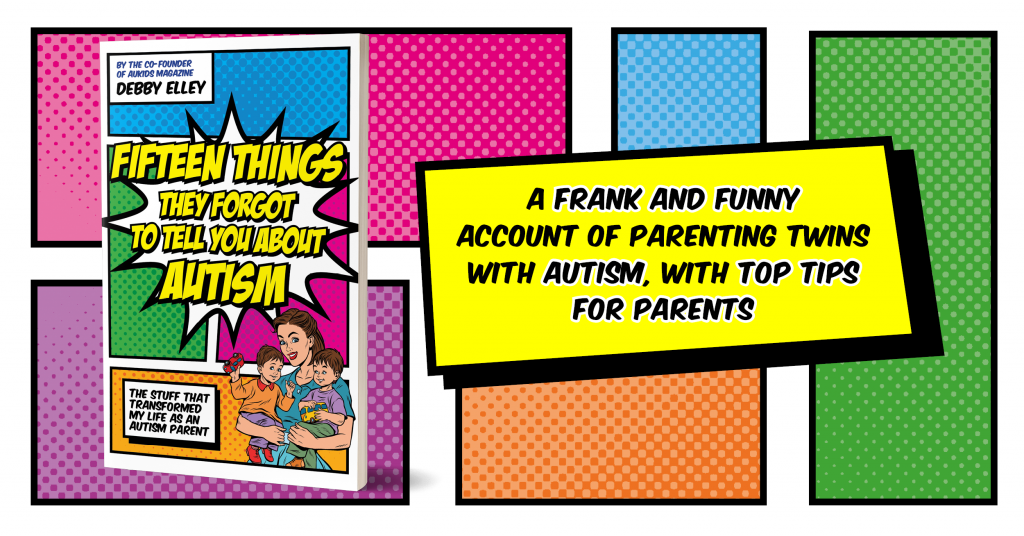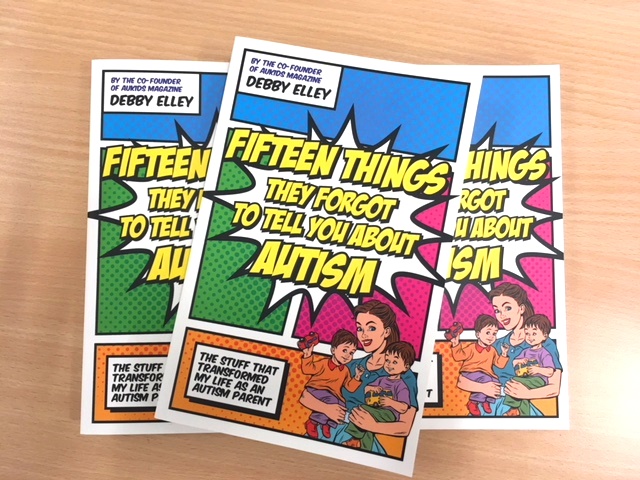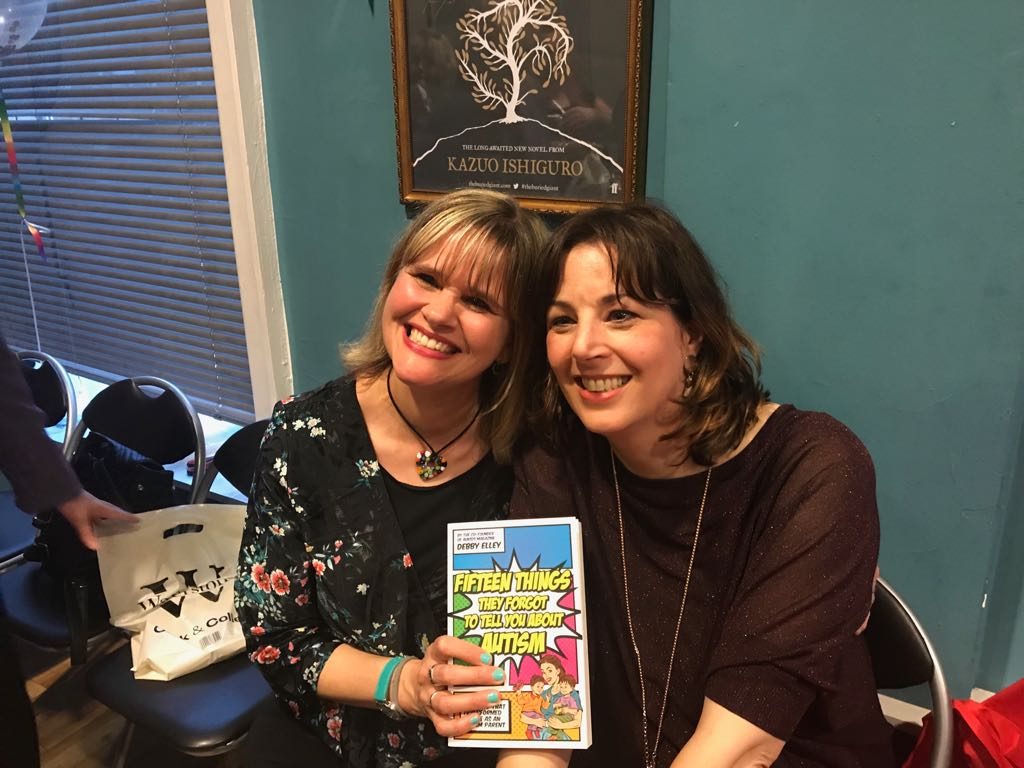Adapted from the inspiring speech she gave at the launch of her first book,
Debby Elley highlights the reasons why she wrote Fifteen Things They Forgot to Tell You About Autism, and why it’s needed.
15 Things They Forgot to Tell You About Autism includes a number of positive quotes from other people, but perhaps the most inspiring of them for me personally was from Martha Washington, First Lady of the United States, who said:
‘The greater part of our happiness or misery depends on our dispositions and not on our circumstances. We carry the seeds of one or the other about with us in our minds wherever we go’.
One of the most important lessons that I’ve learnt is that your perspective on autism – whether you have autism yourself or whether you’re a parent of someone who does – dictates everything you do. To sum up my book, it’s about having twins with autism, not fitting in and not minding that. I firmly believe that if you’re comfortable with who they are, your kids will be comfortable with who they are, too.
I wanted to write a book not just about autism but about living with it comfortably. That’s because I felt that the focus in the books that I’d read was mainly about intervention strategies rather than about a parent’s state of mind – which to me is equally important. I’ve always, enjoyed writing about the funny side of my own experiences. There’s a name for that kind of writing. I think they call it self-centred. I saw an opportunity here to combine writing about my own experiences with practical advice and a little bit of positive psychology. So this book is a mish mash of survival tools, ones that have worked for me and my own family.
When we first knew that our twins had autism, I found myself with three year old boys and a load of oppressive, daunting and dull material to read on the subject of autism. It didn’t immediately strike me over the head that my informal style of writing could make this sort of advice more accessible. That thought struck someone else over the head first. That someone was my friend Tori Houghton, our speech and language therapist at the time, who knew that I had been a journalist and saw the gap for something new. She reckoned that we could fill it with our own autism parenting magazine. Something that would allow parents to share information. That’s how AuKids magazine started up and I’m happy to say that we mark the magazine’s tenth anniversary this July. That’s the back story to the book, because without AuKids, there would be no Fifteen Things.
As well as positive thinking, the second reason for writing the book was to question some of the ways in which we’ve traditionally explained autism to other people. There’s an awful lot about autism that is explained poorly or negatively or not at all. This isn’t some malicious conspiracy. It’s borne of a legacy, the legacy of early messages about autism that people haven’t yet changed. The question I asked myself as I wrote the book was: how can we expect our wider society to understand autism when we haven’t yet found clear ways of explaining it even to ourselves? There are invisible messages sewn up in the words ‘disorder’ and ‘impairment’. They’ve been used so long that people don’t see them any more or realise the effect that they have on a parent’s ability to face the future positively.
So, I have travelled from being someone at the receiving end of those messages to a parent who becomes questioning of them. Those of you who know me know that I can be quite Bolshy and there was anger in me when I eventually discovered that I could have fared a lot better if things had been explained to me in a clearer way earlier. This book was a way of putting that right for other people. As Barack Obama once said: (Yes, I know I’m getting above myself here):
‘Change will not come if we wait for some other person or some other time. We are the change that we seek’.
Thirdly, I wanted to use my experiences over the last ten years to help other parents in a practical way, because there’s nothing quite like someone saying ‘trust me, it works’ to convince you that a strategy is worth pursuing. Some of my approaches have worked only after years of consistency and I hope I prove to parents that it is worth your effort… …. your patience….and most importantly, your faith. So, this book is designed to give other people the benefit of my hindsight. In fact, it probably should have been called HERE’S TWO I DID EARLIER. But as those of you who have lived this process with me will recall, it took about 50,000 attempts to get the title right. Straight after it went to publication, my son Bobby asked “Have you done your book 15 THINGS YOU TOTALLY MISSED ABOUT AUTISM?” and I realised that he’d given it a better title!
I don’t pretend to be an expert. Through co-editing AuKids I’ve been lucky enough to have access to a vast network of experts, and putting their advice into practise has given me the basis for a lot of my practical suggestions in this book. There is another theme that runs through this book, and I’ll just tell you a quick story that sums it up.
I have two older brothers. When we were kids, my brother Dan was a member of the school’s debating society. He used to rehearse his speeches, with me as the only audience member. I would clap extremely enthusiastically because I was only about 13, his biggest fan and I didn’t know what he was going on about half the time. One talk that did stick with me though, was an important and heartfelt attack on fitting in. Dan’s side of this debate was in favour of the motion I’d Rather Be Eccentric Than Trendy. I was rather impressionable at the time and I liked this speech very much. And anyway it was 1984 and what was considered trendy at the time was definitely debatable. Fitting in, he argued, does not create leaders. It does not create original thinkers. It creates a lot of sheep all doing the same thing.
In Fifteen Things They Forgot To Tell You About Autism, I recall that one day I tried to persuade my son Bobby to wear what I considered a trendy top and he replied: “Mum. You don’t have to look cool to be cool”. Bobby reminded me of Dan’s debate and I realised then and there that he was right. I needed to place a much higher value on not fitting in and not place my own insecurities ahead of my son’s need to be himself.
To be autistic, you are by default someone who thinks differently. You are by default eccentric rather than trendy. Your brain is just built that way. As parents we can run a huge risk of just wanting to help our kids to blend in and be invisible, because we don’t want them to be considered eccentric, we don’t want them to be picked on, we want them to be accepted and liked. But if we’re to benefit from a generation of autistic adults who are able to reach the heights of their capabilities, we have to value the differences brought to them by their autism. We talk about acceptance of autism in society as if it’s something that happens outside ourselves. Society is simply our collective conscience… and we as parents have a job to do in stirring that conscience by championing our non-conformist kids with confidence – getting them out there for people to get to know and unapologetically stating yes, they are different and yes, they have different needs.
Ultimately this book is about parents and kids being willing to bridge the gap between two very different types of brain and respecting the differences in each other.
If you would like to read more articles like this and get the latest news and offers on our books about autism, why not join our mailing list? We can send information by email or post as you prefer. You may also be interested in liking our Autism, Asperger’s and related conditions Facebook page.


